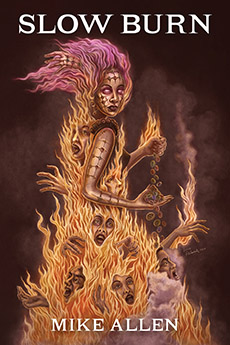Featured Story • May 2017
Ghost Notes
Shveta Thakrar
For Mikey Vuoncino
As Geeta passed through the night-shadowed living room on her way to bed, something sparkled on the windowsill.
A waterfall of silver-white moonbeams cascaded down over her new harp. No, Geeta corrected herself, not over it. Through it, as though the harp were not only painted to reflect light but actually made of it. The strings glittered, a smile like thawing icicles. Inviting? Dangerous? She couldn’t say.
She’d found the harp that morning at an estate sale, petite enough to fit in her lap, its curving papier-mâché frame lacquered the chill blue of ice and strung with silver ribbons. Someone’s art class project, maybe? But there was no signature.
Geeta had never played an instrument in her life, though she’d always wanted to learn the veena. But the harp was too strange, too surreal, to ignore. She drew it close now, inspecting it. There, see? Solid as—as ice.
She randomly tested a string, then cringed, waiting for a screech like that of a misplayed violin. Instead, she elicited a sound high and bright as a rainbow. Its beauty made her shiver.
Grinning, she plucked a second string, then a third. Together, they almost made a song, a tiny spell. No wonder people always used harp music to score fantasy movies; it was the language of magic.
Odd thoughts started to flit around Geeta’s head, trilling through the air on resonant, bell-like chords. Down in the willow garden where me and my love did meet. Just one kiss from your clay-cold lips. He made a harp o’ her breast-bone.
The words were unfamiliar, yet the images they conjured glided through the room, gruesome, ghostly. Geeta blinked hard to clear her vision. Even so, the disjointed movie spooled on, and with it, the need to complete the song.
She’s taen out her little pen-knife,
And twinnd the sweet babe o’ its life.
Arpeggios lilted into her ears and waded through her blood. Her fingers contorted into shapes she’d never learned: open thirds, octaves, inverted D-sevenths. Without waiting for her brain to catch up, they flipped levers again and again, sharpening and flattening the notes. They played and played and played, not caring how the straining ribbons cut into her skin.
She’d stepped into a fairy tale, her hands leaping faster and faster, her heart keeping time as she nimbly wove a tapestry of song.
Crack! The tapestry, earthy and warm as a woolen cloak, ripped apart. Geeta glanced down to see one of the harp strings hanging in two distinct pieces.
No. Impossible. Her pulse pounded in her throat, a demanding metronome in the sudden, aching silence. She had to fix this. She had to restore the music.
Geeta scoured the room with her gaze but saw nothing to replace the broken string. Her scalp tingled, almost a suggestion. Her hair—of course! Frantic, she tore out a long, wavy black strand and threaded it through the hole. Then, with a wary tug, she plucked the ebony band. It rang out, and she sighed her relief. The song must go on.
Though her fingers played on, the words whirling inside her paused. The harp’s curiosity reverberated through her like a tremolo; it had drunk deeply of the old ballads and thirsted now for something new, something different.
Wait. What is this?
Geeta couldn’t tell whether the thought belonged to her or the harp until the intrigued instrument began to excavate the dark caves of her memory. It felt like a pickax breaking through rock walls, sharp and shattering. Geeta shrieked yet continued playing, and the harp gathered its artifacts under the merciless eye of the moon: all the Bollywood movies her parents used to watch, all the folk songs played during garba, all the bhajans her grandmother used to chant.
With each note that spilled from the harp strings, Geeta’s mind laid bare another chamber, lyrics and melodies rushing out to match the force of her dancing fingers. She tried to break away, tried to pinch off the flow. Whatever this was, it was wrong.
More music, more lyrics poured through her as her hands sailed over the strings: Hu to gaiti mele. Do hanso kaa joda bichhad gayo re. Jayo jayo maa jagadambe.
Desperate to stop playing, she clawed at the soundboard. The papier-mâché parted like skin—oh, gods, it was skin—and thick droplets of blood welled up from the wound.
Ladki badi anjani hai. Naina barse rim jhim rim jhim. Ye duniya ye mehfil mere kaam ki nahi.
The harp turned insubstantial, a thing made of mist and memory. Her memories.
Shock echoed within Geeta, a false note; she could see through her flesh, her bones, even her heart. She was as translucent as the harp, as the other shades now flooding out from its strings. Ghosts, she thought, the word dim.
A circle of shades filled the murky room, all skin tones, all genders, all silver of hair. They clutched instruments close: a djembe, a concertina, an erhu, a vihuela, a bone whistle, and several more she couldn’t name. She tried to flee, but their empty eyes pinned her in place. Snatches of their songs played in her ears, hollow and distorted.
A final line leaked from Geeta’s mental archives. Tame kiya te gaam na gori raj achko machko kareli. Each word of the film song bound her more tightly to the shining strings.
Unable to act, she watched as her body staggered up from the chair and set the harp back on the windowsill. Sleep now, said the bloodied instrument, its form still nebulous.
The shell, her body, obeyed, leaving the room. Leaving Geeta, who floated there, exiled.
“Help!” she cried, and the sound emerged as a mournful note from the harp. The strand of her hair vibrated, and the other strings hungrily sucked the shades back into them.
As Geeta’s spirit dissolved into it, the harp shimmered. When it stopped, there sat an ice-blue veena with a single black string among many paler ones.
Before long, that darker string, too, turned to silver, flashing in the light of the full moon.
 Shveta Thakrar is a writer of South Asian–flavored fantasy, social-justice activist, and part-time nagini. Her work has appeared or is forthcoming in Flash Fiction Online, Interfictions Online, Mythic Delirium, Uncanny, Faerie Magazine, Strange Horizons, Mothership Zeta, Kaleidoscope: Diverse YA Science Fiction and Fantasy Stories, Clockwork Phoenix 5, Beyond the Woods: Fairy Tales Retold, A Thousand Beginnings and Endings, and Toil & Trouble. When not spinning stories about spider silk and shadows, magic and marauders, and courageous girls illuminated by dancing rainbow flames, Shveta crafts, devours books, daydreams, draws, travels, bakes, and occasionally even plays her harp.
Shveta Thakrar is a writer of South Asian–flavored fantasy, social-justice activist, and part-time nagini. Her work has appeared or is forthcoming in Flash Fiction Online, Interfictions Online, Mythic Delirium, Uncanny, Faerie Magazine, Strange Horizons, Mothership Zeta, Kaleidoscope: Diverse YA Science Fiction and Fantasy Stories, Clockwork Phoenix 5, Beyond the Woods: Fairy Tales Retold, A Thousand Beginnings and Endings, and Toil & Trouble. When not spinning stories about spider silk and shadows, magic and marauders, and courageous girls illuminated by dancing rainbow flames, Shveta crafts, devours books, daydreams, draws, travels, bakes, and occasionally even plays her harp.
About this story, Shveta tells us, “I actually ended up trying my hand at this story because I was afraid of flash fiction! I’d convinced myself I couldn’t do it. How to pack a complete story into such a small space? It seemed impossible, at least for me. But Barbara A. Barnett, a notorious flash writer and part of my writing group The Star-Dusted Sirens, convinced me to stretch myself and give it a go. So I thought about things I like, including stringed instruments and creepy ballads and old Hindi film songs, and how I’d love to see those things put in a different, fusion sort of context, and the next thing I knew, I was writing ‘Ghost Notes.’”
![]()
If you’ve enjoyed what you’ve read, please consider pitching in to keep us going. Your donation goes toward future content.
![]()















